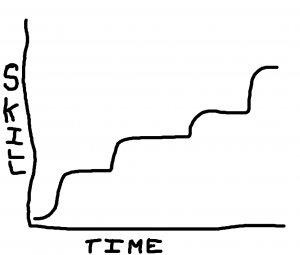After my Gaming Hardware post I decided to have a look at what the gaming field is up to i.e. do ping times still dominate the conversation. Is everyone still as infatuated with performance as they were several years ago. I used to do some gaming and I would still like to
but I get too sucked into it and lose weeks of my life so I made
a conscious decision to stop. I backslide every once in a while when a killer game comes out or if I play something somewhere and get hooked.
 Caveat: I am not addressing game enjoyment in this post its game performance i.e. do you want to be the last man standing. High performance hardware does lead to more “fun” etc but not necessarily better gaming performance. When I say mid-range hardware I am also not talking about moms word processor or 3 year old hardware. It needs to be reasonably decent hardware to run the game properly.
Caveat: I am not addressing game enjoyment in this post its game performance i.e. do you want to be the last man standing. High performance hardware does lead to more “fun” etc but not necessarily better gaming performance. When I say mid-range hardware I am also not talking about moms word processor or 3 year old hardware. It needs to be reasonably decent hardware to run the game properly.
From a casual glance around the net it would appear that hardware performance and hardware issues seem to dominate the message boards. I always found the perpetual hardware performance chasing and worrying about hardware to be a distraction.
I remember playing games on mid range hardware, for the time, and dealing out my fair share of mayhem. In general the people who were trouncing everyone were also running mid range hardware. Don’t get me wrong I’m not talking PC world hardware, that’s what I would call bottom of the range. The machines were mostly hand built based on bang for buck at computer fairs on Tottenham Court Road. The biggest factor I found in action games was ping times not hardware. Above a certain level of performance it seemed to matter very little what hardware you were running.
I’m not sure if this still holds but I believe ping times and player performance still dominate overall gaming performance. Slight digression… It annoys me to see how much emphasis there is on the hardware performance but it’s in the interests of the manufacturers to make sure that performance is seen as a big advantage in gaming or anything. The following is a question I have heard more than once.
My PC is slow on the internet, what sort of PC would you recommend to speed it up?
The PC is most likely not the problem in this case, its the connection. You can browse the quite happily on 5 year old hardware if the connection is good. Shop owners are also selling PC’s that people don’t need its a bit like going looking for a Mondeo and coming out with a Ferrari.
Anyway, back to the main point. Lets assume all ping times are equal. If this is the case then player performance really matters. To get good at something involves practice and lots of it so it pays to watch how sports teams or the military train, its drill, drill, drill. The military make you go through the motions so often you are sick of it but can do it blindfolded. There’s not a huge amount of fun in this and it involves a lot of effort and mental stamina, it’s also why not everyone is cut out for the military or sport. My brother played Super Mario Bros to the point where he would reset it if he lost a life and was able to easily complete the entire game with one life. It was when I seen him do this that I knew I would never be a great gamer. To be great at any sport involves this level of dedication and yes I consider gaming to be a sport.
So if you’re serious about gaming stop focusing on hardware etc and start focusing on yourself. Are you fit, well rested? Do you respond faster to sound than light? Do you drink alcohol, take too much caffeine, how much caffeine is too much? What time of day are you at your best? What’s your resting heart rate? How often do you practice, are your opponents as good or better than you? Drill Drill Drill….
My personal opinion is that most of us don’t need to focus on hardware that much. Ping times possibly but I don’t believe hardware would give me that much of an edge. It may make the game more fun or a better overall experience but this does not necessarily mean I would perform better.





